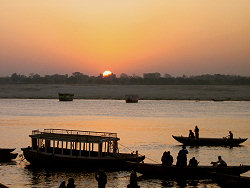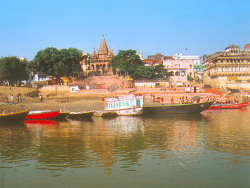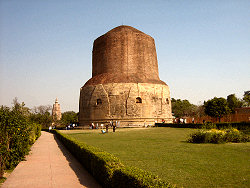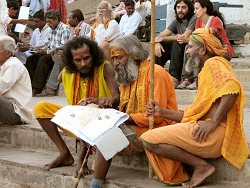Varanasi
"Benaras was famous before Rome was known, and for many centuries has claimed and gained the homage of every devout Hindu. Its rivers, its temples, its banks, are known and revered throughout India. Its very air and soil are counted holy. Residence in the city ensures salvation, death there makes salvation doubly sure."
- Reverend Charles Phillips Cape
"Benares is older than history, older than tradition, older even than legend, and looks twice as old as all of them put together."
- Mark Twain
The Place - Varanasi
 The sun rises over river Ganga at Kashi
The sun rises over river Ganga at KashiVaranasi, the religious capital of India, particularly the Hindus, is the oldest living city in the world. Situated on the western bank of the River Ganga as it takes a northward turn in eastern Uttar Pradesh, India, it is bounded by two small tributaries, Varuna in the north and Assi in the south, which give it its name Varanasi. The oldest and even today the most popular name of the city is KASHI (the Luminous). Another name of the city is Benares, the corrupted English form of the original Pali word 'Baranasi'.
It is believed by the devout Hindu that Kashi is the city of Shiva, founded at the very dawn of creation and it never gets destroyed even during the Pralaya or the Great Deluge.
 A view of holy Kashi
A view of holy KashiKashi with its numerous temples and shrines, ashramas, bathing ghats and pavilions that stretch along the river for nearly 5 km was a great cultural centre of India for thousands of years. From the dawn of time the dream of every devout Hindu is to visit Kashi at least once in his life time. Here every day thousands of pilgrims pour in from all parts of the country to have a purifying dip in the holy Ganga and to have a darshan (glimpse) of Sri Vishwanatha (Lord of the Universe),the chief deity of the city, and of Mother Annapurna, His Divine Consort.
 The place of the first sermon - Sarnath
The place of the first sermon - SarnathKashi is also a place of pilgrimage to Jains and Buddhists. The 7th and 23rd Tirthankaras 'Suparshva' and 'Parshvanatha' respectively were born in Kashi. The founder of Jainism, Mahavira, has preached here. In nearby Saranath or Rishipatana (10 km), Gautama Buddha (6th Century BCE) gave his first sermon, 'Dharmachakra Pravartana' (turning the Wheel of Dharma), to his first five disciples.
Parts of the city (including many major temples like Vishwanath and Beni Madhav) were destroyed repeatedly between the 12th and 17th centuries by the various Muslim rulers of the North. But every time they were rebuilt on the top of the ruins and rubble.
 While wandering, a halt at Kashi
While wandering, a halt at KashiThrough the centuries, countless saints, sages and savants, philosophers, scholars and reformers, poets, writers and musicians have either lived in or visited the city. To name a few - Maharshi Veda Vyasa, Patanjali, Shankara, Ramanuja, Vallabha, Ramananda, Kabir, Ravidas, Tulsidas, Chaitanya, Guru Nanak, Guru Gobind Singh, Ramakrishna, Vivekananda, Raja Ram Mohan Roy, Dayananda Saraswathi, Rani Laxmibai of Jhansi, Subrahmanya Bharathiyar, Annie Besant, Pandit Madan Mohan Malaviya (founder of Banaras Hindu University) and Ustad Bismillah Khan.
 A cauldron of many faiths
A cauldron of many faithsVaranasi is a railway junction. Nearby Mughal Sarai (20 km) is an important railway junction having train connections to places all over India. There are daily trains to Delhi, Kolkata, Mumbai and Hyderabad. The city is on NH2 connecting Delhi and Kolkata. It has an International Airport at nearby Babatpur (25 km) having daily flights to Delhi, Kolkata and Mumbai. Cycle Rickshaws, Auto Rickshaws and private taxis are the common mode of transport in the city. The city has several hotels and guest houses, including one or two 5 Star Hotels.


